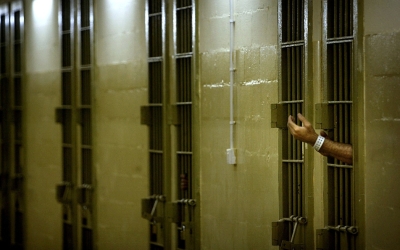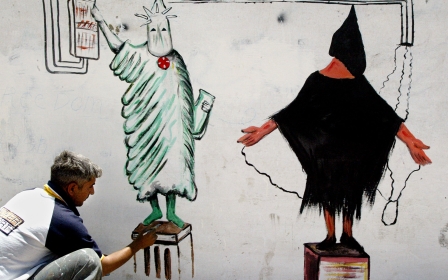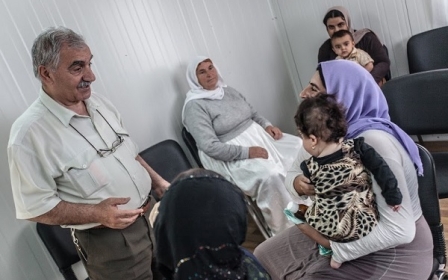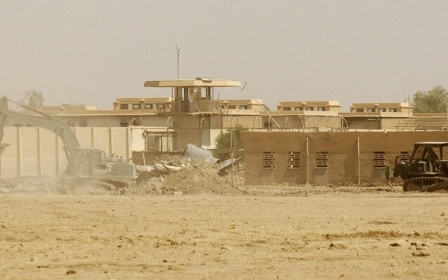US contractor held liable for torture, with jury awarding $42m to Abu Ghraib survivors

A US jury on Tuesday awarded $42m to three Iraqi men formerly detained and abused at Abu Ghraib prison in Iraq.
The decision holds defence contractor Caci International responsible for its role in the abuse experienced at the notorious prison during the 2003-2004 US occupation of Iraq.
The landmark verdict marks the first time a private civilian contractor has been held responsible for the abuses at the notorious Iraqi prison just outside of Iraq's capital, Baghdad.
The decision comes after a prior jury failed to reach a verdict, highlighting a renewed commitment to accountability in a case that has spanned nearly two decades. This time around, a jury comprising six women and two men in the US district court in Alexandria, Virginia, seven miles south of downtown Washington, DC, took just a day and a half to reach a verdict.
The 2004 images documenting the torture, rape, abuse, and humiliation meted out to detainees at the hands of US personnel at Abu Ghraib was a milestone moment in the US occupation of Iraq, which human rights groups at the time said was a pattern, not “isolated” incidents, as the George W Bush administration claimed after the scandal broke.
New MEE newsletter: Jerusalem Dispatch
Sign up to get the latest insights and analysis on Israel-Palestine, alongside Turkey Unpacked and other MEE newsletters
The plaintiffs, Suhail al-Shimari, Salah al-Ejaili, and Asa’ad Zuba’e, recounted harrowing experiences at the prison, including sexual abuse, beatings, forced nudity, and other forms of torture.
Although the men did not accuse Caci International’s employees of directly inflicting the abuse, they argued that Caci’s interrogators conspired with military police to “soften up” detainees for questioning through brutal treatment.
This jury’s decision is the first of its kind, establishing a legal precedent in holding private contractors accountable for human rights abuses during military operations.
Long-sought justice
Baher Azmy, the Center for Constitutional Rights’ legal director, emphasised the bravery of the plaintiffs who “fought bravely for 16 years in search of justice for the horrors they endured at Abu Ghraib”. He lauded the verdict as a powerful acknowledgement of their courage, crediting the jury for recognising the plaintiffs’ experiences over the “deflections of CACI”.
For Ejaili, a journalist, the verdict represented long-sought justice.
“Today is a big day for me and for justice,” he said. “This victory isn’t only for the three plaintiffs in this case against a corporation. This victory is a shining light for everyone who has been oppressed and a strong warning to any company or contractor practising different forms of torture and abuse. Those companies should no longer feel exempt from accountability moving forward.”
The landmark case, Al Shimari, et al. v. CACI, was filed in 2008 under the Alien Tort Statute, which allows foreign nationals to pursue redress for international law violations in US courts.
The legal journey was prolonged, with Caci making numerous attempts to have the case dismissed.
Testimonies in court drew from multiple sources, including military reports that documented the abuses and highlighted disturbing details about the experiences of the plaintiffs.
Shimari described suffering electric shocks, being dragged by a rope, and enduring beatings. Ejaili shared that he was subjected to stress positions, forced into women’s underwear, and faced threats from dogs.
Although Caci argued that liability should rest solely with the US military, the plaintiffs contended that the contractor’s employees had actively contributed to setting the conditions of their abuse.
This trial marks the first time an Abu Ghraib case has reached a US jury, offering a rare instance of accountability for post-9/11 “war on terror” abuses.
Katherine Gallagher, from the Center for Constitutional Rights, said the verdict means “private military and security contractors are put on notice”.
“For 20 years, CACI has refused to take responsibility for its role in torture at Abu Ghraib. The jury’s verdict makes clear CACI’s role in this shameful part of our history.”
Middle East Eye delivers independent and unrivalled coverage and analysis of the Middle East, North Africa and beyond. To learn more about republishing this content and the associated fees, please fill out this form. More about MEE can be found here.





